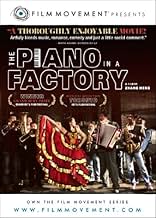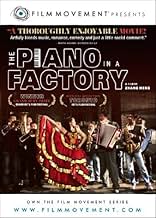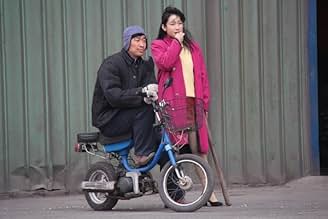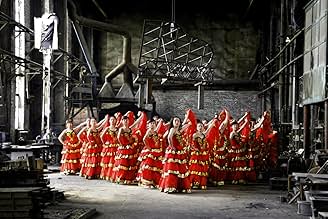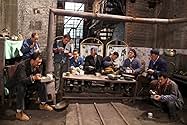IMDb RATING
7.4/10
1.6K
YOUR RATING
To fight for custody of his daughter who loves playing the piano, a steel factory worker decides to forge a piano from scratch.To fight for custody of his daughter who loves playing the piano, a steel factory worker decides to forge a piano from scratch.To fight for custody of his daughter who loves playing the piano, a steel factory worker decides to forge a piano from scratch.
- Awards
- 25 wins & 33 nominations total
- Directors
- Writer
- All cast & crew
- Production, box office & more at IMDbPro
Storyline
Featured review
THE PIANO IN A FACTORY, is the second film from the young Chinese writer-director Meng Zhang, and had made a splash when its leading actor Qianyuan Wang won a coveted BEST ACTOR AWARD at Tokyo International Film Festival in 2010, but delayed for half a year until its theater release, it crashed and burned in the box office which stimulated another shouting diatribe on the unhealthy status quo which bars art-house films from seizing a sizable piece of cake in the prosperous mainland cinema market. Without a booming front-loaded attendance, these movies will be replaced by more popular fares merely within a few days of release thanks to cinema managers' money-seeking priority.
Four years have passed, the situation may not ameliorate too much, Meng's follow-up THE UNCLE VICTORY (2014) has just won Grand Jury Prize in this year's Shanghai International Film Festival and soon will be pushed to test the water. However, in retrospect and after finally watched his 2010 output in a sub-par DVD copy, the film does has its own unique demographic target, and relies heavily on our generation's nostalgia.
The story is set in the early 90s, an industrial town in northeast China, a former steel factory employee Guilin (Qianyuan Wang) decides to make a steel piano from scratch (with the help from his blue-collar fellows and a retired scientist as the brain) in order to keep his daughter Xiaoyuan (Xingyu Liu) from choosing her gold-digging mother after the divorce. The premise itself sounds both self-deceptive and self-motivating, as his girlfriend Shuxian (Hailu Qin) pierces to the truth with her pertinent remark, there is no guarantee he can win Xiaoyan's custody even they could complete the piano. Indeed, it is exactly what Meng intends to tell his audience, to build a piano is not a solution but a means to evoke us to feel sympathetic to a disappeared era, as overtly exhibited in the smokestacks-demolishing scenes with the tableaux reminds us of Mao's time.
One devoted characteristic is the miscellany of 90s Chinese pop melodies, Soviet folk songs and even jingles from the vintage Nintendo video games, which is profusely grafted on various scenarios (from funeral to wedding ceremony, as Guilin forms an amateurish band to make ends meet), and perilously borders on over-exploitation; the cinematography is constantly panning horizontally, conjures up some fluid mobility which heartily generated from everyday drollness under the perpetually murky and melancholy light and derelict settings.
Qianyuan Wang and Hailu Qin are convincingly submerging into their characters and efficiently reveal their inner sentiments with certain verve. The remainders are mostly non-pro actors in aid of the project due to its measly budget, all bathe with real-life authenticity except one grating presence of South Korean actress Shin-yeong Jang (apparently a casting proviso from the film's Korean executive producer, Jae-young Kwak), who plays Guilin's ex-wife and is utterly devoid of credibility as an ex-worker and an illiterate, there are nuances to tell Chinese from South Koreans, although through a westerners' eyes, it would not be so conspicuous.
So in a nutshell, Meng greatly encapsulates the zeitgeist of the time and it is a sound step for him to emerge as a bona-fide sculptor of a bygone time, only if he could minus a shade of the overblown sentimentality and tone down all the fanfare to meet the eyes and bombard the ears, this picture would connect more audience out of the millions middle-age nostaglist originate from Northeastern region in China.
Four years have passed, the situation may not ameliorate too much, Meng's follow-up THE UNCLE VICTORY (2014) has just won Grand Jury Prize in this year's Shanghai International Film Festival and soon will be pushed to test the water. However, in retrospect and after finally watched his 2010 output in a sub-par DVD copy, the film does has its own unique demographic target, and relies heavily on our generation's nostalgia.
The story is set in the early 90s, an industrial town in northeast China, a former steel factory employee Guilin (Qianyuan Wang) decides to make a steel piano from scratch (with the help from his blue-collar fellows and a retired scientist as the brain) in order to keep his daughter Xiaoyuan (Xingyu Liu) from choosing her gold-digging mother after the divorce. The premise itself sounds both self-deceptive and self-motivating, as his girlfriend Shuxian (Hailu Qin) pierces to the truth with her pertinent remark, there is no guarantee he can win Xiaoyan's custody even they could complete the piano. Indeed, it is exactly what Meng intends to tell his audience, to build a piano is not a solution but a means to evoke us to feel sympathetic to a disappeared era, as overtly exhibited in the smokestacks-demolishing scenes with the tableaux reminds us of Mao's time.
One devoted characteristic is the miscellany of 90s Chinese pop melodies, Soviet folk songs and even jingles from the vintage Nintendo video games, which is profusely grafted on various scenarios (from funeral to wedding ceremony, as Guilin forms an amateurish band to make ends meet), and perilously borders on over-exploitation; the cinematography is constantly panning horizontally, conjures up some fluid mobility which heartily generated from everyday drollness under the perpetually murky and melancholy light and derelict settings.
Qianyuan Wang and Hailu Qin are convincingly submerging into their characters and efficiently reveal their inner sentiments with certain verve. The remainders are mostly non-pro actors in aid of the project due to its measly budget, all bathe with real-life authenticity except one grating presence of South Korean actress Shin-yeong Jang (apparently a casting proviso from the film's Korean executive producer, Jae-young Kwak), who plays Guilin's ex-wife and is utterly devoid of credibility as an ex-worker and an illiterate, there are nuances to tell Chinese from South Koreans, although through a westerners' eyes, it would not be so conspicuous.
So in a nutshell, Meng greatly encapsulates the zeitgeist of the time and it is a sound step for him to emerge as a bona-fide sculptor of a bygone time, only if he could minus a shade of the overblown sentimentality and tone down all the fanfare to meet the eyes and bombard the ears, this picture would connect more audience out of the millions middle-age nostaglist originate from Northeastern region in China.
- lasttimeisaw
- Jun 24, 2014
- Permalink
Details
Box office
- Gross worldwide
- $989,775
- Runtime1 hour 59 minutes
- Color
- Sound mix
- Aspect ratio
- 1.85 : 1
Contribute to this page
Suggest an edit or add missing content

Top Gap
By what name was The Piano in a Factory (2010) officially released in Canada in English?
Answer

